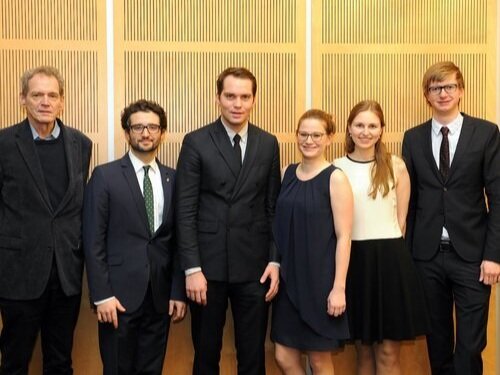Obermayer German Jewish History Award
Robert Krais
Ettenheim, Baden–Württemberg
When Robert Krais saw the coffins being loaded onto the plane at Munich’s Riem airport in 1972, he finally began to understand. Krais knew about the Holocaust, but until that moment, Auschwitz had remained remote and abstract. That changed on the day he saw the Israelis leave the Olympic Games with the bodies of their eleven compatriots, murdered by terrorists. He remembers thinking, “Here again are dead Jews leaving Germany. This was for me a crucial experience from which everything since has evolved.” At the Olympic Games he was in charge of Israelis in the youth camp.
Since then, the 63-year-old, who lives and works in southwest Baden-Württemberg, has dedicated his spare time to keeping Jewish history alive and promoting understanding between Germany and Israel. “His name is synonymous with German-Jewish and Christian-Jewish reconciliation in the region,” says Martin Gross, Krais’ successor as chairman of the German Israeli Association of Suedlicher Oberrhein, an organization he co-founded in 1974.
As a German Sports Youth official and a trained social worker, Krais started exchange programs between Israel and Germany. He first initiated the visit of Israeli athletes in 1970 to Buehl. He organized more than 15 additional exchanges until 1994. Groups of up to 50 youth, including soccer and table tennis players as well as singers and dancers, stayed with German or Israeli families.
Krais is convinced that personal contact with Jews is an important basis for understanding and reconciliation. “It wasn’t [my] parents, school, or youth groups that made me sensitive to the expulsion of Jews from Germany; it was through personal encounters,” he says. Exchanges and personal encounters became a fundamental principle not only of the German Israeli Association but also of the Catholic youth group Erinnern und Begegnen (“commemoration and exchange”), which he co-founded in 1988. For the latter group in the archdiocese of Freiburg, where he is employed, he has organized numerous talks with survivors and visits to and from Jewish ongregations in southern Germany and France. Krais also helped initiate the creation of a memorial for Jews deported from Baden.
“Today he is the heart of our communication efforts,” Gross says. Krais has established and cultivated contacts with hundreds of Jews who have ties to the region. Since the ’80s, he has lobbied community officials in his hometown of Ettenheim to invite former Jewish citizens, and he writes frequent letters and publishes articles in the local press about the fate of former residents. “More than once, he has visited a dying person to capture memories that otherwise would have been lost,” says Wolfgang Winkler, a friend who has helped Krais with many of his projects. “He reaches out, and many reach back.”
Kurt Meier is a New Yorker who fled Germany and thought he would never return—until he met Krais. “He puts you instantly at ease,” Meier describes. “You feel you can trust him, which is a wonderful quality for those whose experiences in Germany have made them suspicious.” Hedy Epstein, another survivor, adds: “Telling my story, especially in Germany, has helped in my healing process.”
Krais is also persistent. For years, he lobbied to save the Kippenheim synagogue. After 1945, an agricultural organization had taken over the building, drastically changing the architecture and storing farm products there. “Above the entrance door, a statement is still visible that says, ‘This is nothing but a house of God,’ and we Christians stored swill in it,” Krais remembers. Because of his efforts, the community bought the building. Now it has been restored and is protected as a historic monument, and a Kippenheim residents’ association offers a range of cultural activities there. “For me,” Krais says, “it was and is a house of God and a monument reminding us what we have done since the war.”
He has also managed to have recorded the burial records and inscriptions from the Schmieheim Jewish cemetery, the largest in southern Baden-Wuerttemberg, and he raised funds to send the two-volume set, which provides detailed information about the nearly 3,000 people buried there, to all the known former Jewish citizens and their descendants.
A serious illness has made Krais’ future uncertain. If he gets the chance, he knows what he wants to do: create a book about the exile experience based on countless letters, stored in several large boxes in his apartment, written by Jews who once lived in the region and their descendants. “These letters reflect the strong desire that someone tell their stories and the hope that their names are not forgotten,” he says. It is what he has worked toward for more than 30 years.
THIS WALL BRINGS PEOPLE TOGETHER
Students at this Berlin elementary school, built on the site of a synagogue, have been building a wall for the past two decades. It delivers a powerful message about community.
STUDENTS REACHING STUDENTS
When a handful of ninth graders from Berlin met Rolf Joseph in 2003, they were inspired by his harrowing tales of surviving the Holocaust. So inspired that they wrote a popular book about his life. Today the Joseph Group helps students educate each other on Jewish history.
“I SPEAK FOR THOSE WHO CANNOT SPEAK”
Margot Friedländer’s autobiography details her struggles as a Jew hiding in Berlin during World War II. Now 96, she speaks powerfully about the events that shaped her life and their relevance today.



